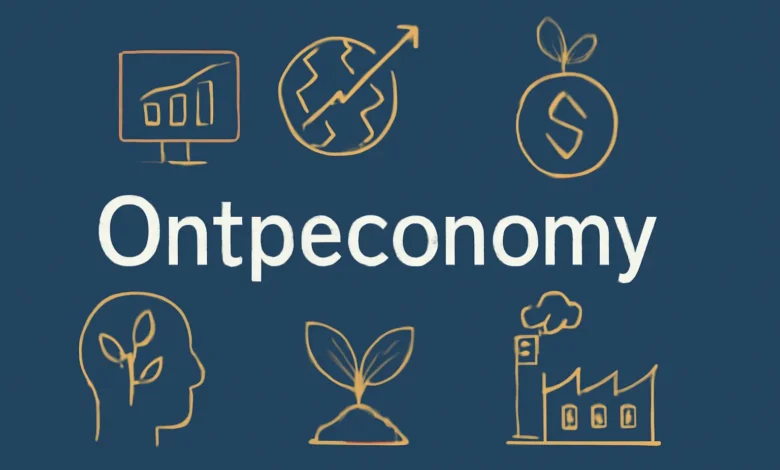Understanding Ontpeconomy: The Next Evolution in Economic Systems

Introduction:
The world of economics is constantly evolving, adapting to the challenges and advancements of society. One emerging concept that has garnered attention in recent years is “Ontpeconomy.” While the term may seem unfamiliar, it holds the potential to reshape how we think about economies and how they function. In this article, we’ll explore what Ontpeconomy is, its implications, and how it could revolutionize the way we interact with economic systems.
What is Ontpeconomy?
Ontpeconomy is a term that merges the ideas of ontology and economy. Ontology, the philosophical study of being, existence, and the nature of reality, is combined with economics to form a new paradigm. At its core, it seeks to understand how economic systems can function within a broader context of human existence, focusing on the intersection of technology, society, and economy. It looks beyond traditional economic models, aiming to integrate digital transformation and sustainability into economic thinking.
The concept is built on the premise that the economy isn’t just about transactions or market forces, but about how economic systems interact with social, environmental, and technological factors. Ontpeconomy could allow for a deeper, more holistic approach to understanding how resources are distributed and utilized in societies.
How Ontpeconomy Works
Ontpeconomy operates on several principles that deviate from traditional economic models. One of the foundational concepts is the shift from a linear model of economy, which focuses on production, consumption, and disposal, to a more circular and sustainable approach. It emphasizes the need for understanding and preserving the connection between people, businesses, and ecosystems.
In an Ontpeconomy, the role of data, artificial intelligence (AI), and automation is crucial. By utilizing advanced technologies, it can create systems that track and manage resources more efficiently. Instead of viewing the economy as a rigid, mechanical system, Ontpeconomy views it as a dynamic and evolving structure, capable of adapting to changing needs and innovations.
For example, in the traditional economy, businesses might focus on maximizing profits through volume sales or production. However, in an Ontpeconomy, businesses would also be tasked with understanding the environmental and social impacts of their operations. This model pushes the boundaries of corporate responsibility by making it central to economic activity.
The Role of Technology in Ontpeconomy
Technology plays a pivotal role in Ontpeconomy. Advances in AI, blockchain, and the Internet of Things (IoT) have the potential to redefine how economies function. These technologies allow for smarter decision-making, resource allocation, and enhanced transparency.
AI is particularly important in this, as it can analyze vast amounts of data to forecast trends, optimize supply chains, and reduce waste. AI can help identify areas where efficiencies can be gained, whether through energy savings, resource management, or labor optimization.
Blockchain, on the other hand, can provide a decentralized approach to economic transactions, ensuring greater transparency and trust. It could disrupt industries like finance, supply chain management, and even voting systems, promoting a more equitable and open economic environment.
Sustainability and Ontpeconomy: A Holistic Approach
One of the most compelling aspects of Ontpeconomy is its focus on sustainability. Traditional economies often overlook the environmental and social costs of economic growth. In contrast, it recognizes that long-term prosperity depends on the preservation of natural resources and the well-being of future generations.
Sustainability in Ontpeconomy is not just about reducing carbon footprints; it’s about creating systems that promote a circular economy. This means products are designed to be reused, repaired, and recycled, reducing waste and minimizing environmental harm. This is a radical departure from the traditional “take, make, dispose” model that dominates many industries today.
In this, businesses and individuals are encouraged to consider the broader impact of their economic decisions. For example, the concept of “cradle-to-cradle” design could become more widespread, where products are created with the intention of being fully recyclable or reusable at the end of their lifecycle.
The Social Impact of Ontpeconomy
Another important aspect of Ontpeconomy is its potential to create more equitable economic systems. Traditional economic models often focus on wealth accumulation and growth, but it seeks to ensure that prosperity is shared more broadly across society. The shift towards a more sustainable, data-driven economy could lead to greater income equality and improved access to resources for all individuals.
For instance, in an Ontpeconomy, digital platforms could facilitate the redistribution of wealth, helping to connect people in underprivileged regions with resources, education, and opportunities. The rise of universal basic income (UBI) as a concept also fits within the it model, where technology and automation provide the means for individuals to live more comfortably, even without traditional jobs.
Additionally, Ontpeconomy may promote the growth of local economies, where small businesses can thrive in a more interconnected world. Rather than relying on large multinational corporations, local businesses could tap into global markets through digital platforms, fostering innovation and entrepreneurship.
The Potential Challenges of Ontpeconomy
While it offers numerous opportunities for a more sustainable and equitable future, it’s not without its challenges. One of the major hurdles is the transition from existing economic systems to this new model. Traditional industries, governments, and businesses will need to adapt to the shifting demands of Ontpeconomy, which may require significant investments in technology and infrastructure.
Another challenge is the potential for inequalities in access to technology. While Ontpeconomy can empower individuals through technology, those who lack the necessary skills or resources may be left behind. Bridging the digital divide will be essential to ensure that it benefits everyone.
Lastly, Ontpeconomy also raises questions about privacy, data security, and governance. With more personal and economic data being collected and analyzed, there are concerns about how this information is used and protected. Ensuring that ethical standards are upheld and that individuals’ rights are respected will be crucial as it evolves.
The Future of Ontpeconomy
The future of Ontpeconomy is both exciting and uncertain. As technology continues to advance, this could revolutionize how we think about work, consumption, and prosperity. The integration of AI, blockchain, and sustainability practices could lead to a more balanced and inclusive economy.
We may see a shift in how wealth is measured, with social and environmental capital becoming as important as financial capital. it could push businesses to prioritize long-term impacts over short-term profits, leading to a more sustainable and socially responsible global economy.
However, for Ontpeconomy to succeed, it will require cooperation from governments, corporations, and individuals. Policies that support innovation, sustainability, and inclusivity will be essential. Moreover, ongoing research and development in the fields of AI, blockchain, and other technologies will be critical to making Ontpeconomy a reality.
Conclusion: A New Dawn for Economic Thinking
Ontpeconomy represents a bold new vision for the future of economic systems. By integrating the principles of ontology, sustainability, and advanced technology, it promises to reshape the way we understand and engage with the economy. While challenges remain, the potential benefits for society, the environment, and businesses are immense. As we move forward, Ontpeconomy could very well be the key to unlocking a more balanced, equitable, and sustainable future for all.



